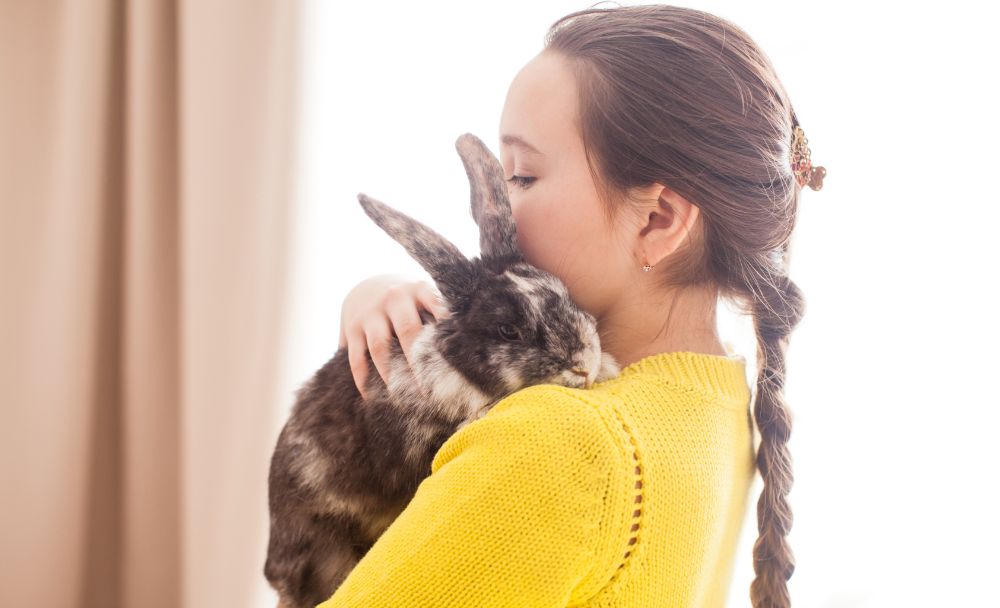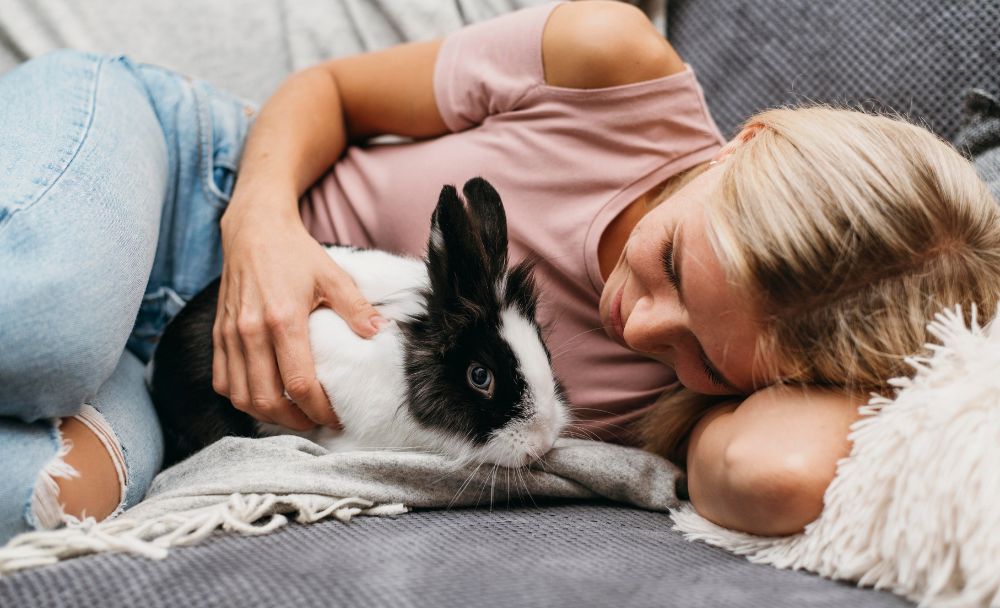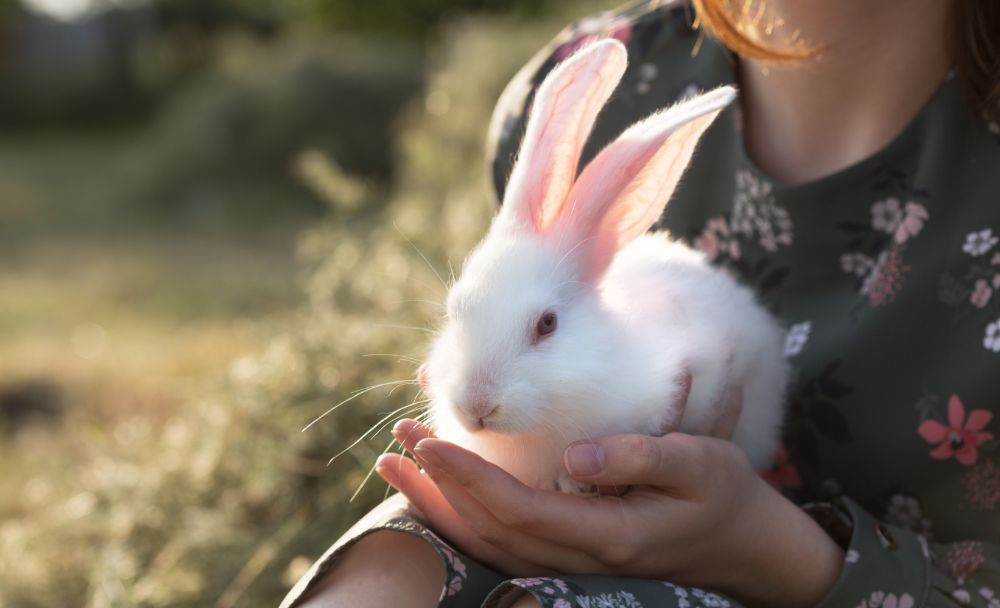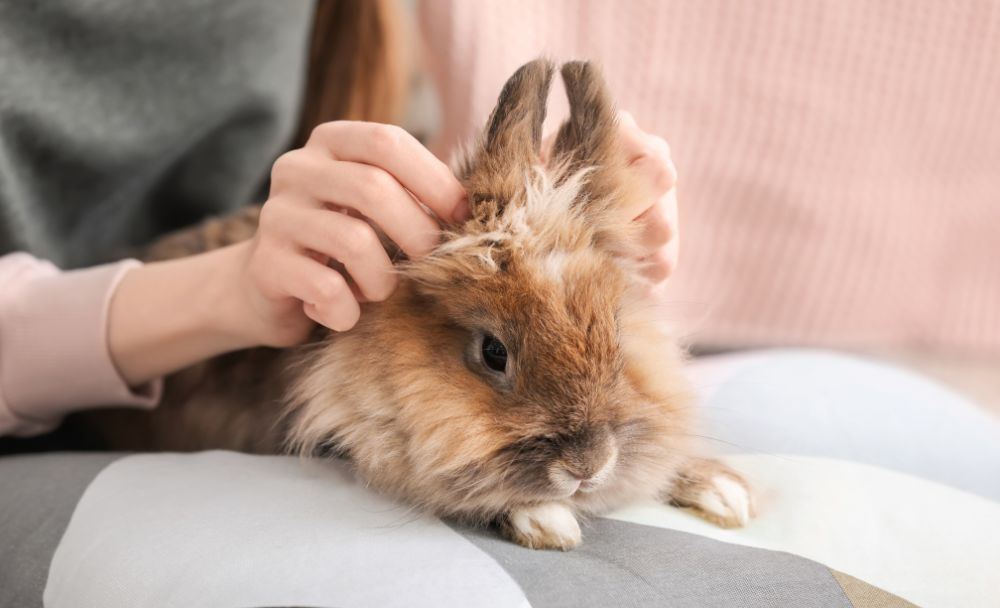While most people recognize that a rabbit is a cute, cuddly, and fluffy animal, they may not realize a rabbit can also be an emotional support animal (ESA). Learn all about what types of support a rabbit as an ESA offers, whether you should consider getting one, and what is involved in having an emotional support animal.
Rabbits as Emotional Support Animals – How Does This Work?
Rabbits are ideal emotional support animals. They are quiet, easy to care for, bond well with humans, and cost less to keep than other ESAs. Rabbits naturally snuggle and comfort you when you are feeling depressed or anxious. Caring for a rabbit can help maintain healthy routines to benefit your mental health.
What Does an Emotional Support Rabbit Do?

While rabbits are undeniably cute, it’s their cuddly and friendly nature that helps people with a mental health condition to better cope and not get as stressed. For someone with anxiety, having a fluffy pet rabbit they can hold when they feel anxious is a great distraction from the negative circular thinking that causes emotional overload.
Instead of stressing and thinking about negative things, you can hold and stroke your ESA rabbit, play games with them, or take them for a walk outside.
Essentially, an ESA doesn’t have to “do” anything. They only need to be there, ready to shower you with love and support. Rabbits work so well as emotional support animals because they don’t require extra training to do what they do naturally.
7 Qualities that Make a Rabbit a Great Therapy Animal

Rabbits already have most of the qualities that make for a great ESA. These are natural instincts to rabbits and don’t have to be trained into them.
1. Highly Intelligent
Since rabbits are naturally intelligent, they easily sense when their human is feeling down or is building up toward a mental breakdown. They know that being close to their human will help make things better, indicating an emotional intelligence that matches dogs.
2. Docile Nature
Rabbits are known as being peaceful animals that won’t bite or kick or scratch unless they are incorrectly handled. Dogs as ESAs can become aggressive, bite, or even scratch their owners and people around them, making rabbits much better and safer to be around.
3. Less Space Required
Okay, if you live in a large house with a yard, you can go for a dog as an ESA, but in a small walk-up apartment, you may not be able to keep a dog or take them for walks.
Fortunately, rabbits aren’t nearly as difficult to keep in small spaces. Even hopping about your small room is enough exercise for your rabbit per day, though you can take them for longer walks to local parks and gardens where you can both relax.
4. Easy to Keep
Rabbits are easy to keep, relatively cheap to buy and look after, and they don’t require specialized training to keep.
Where an ESA dog may need to be trained and you’d have to work on intimidating them and being the leader, a rabbit is a submissive animal that will happily follow your lead.
5. Lifespan
Unlike smaller animals like rodents that live a few years, rabbits can live over a decade or more if they are well looked after. This gives you many years to build a supportive relationship with your rabbit as your emotional support animal.
6. Tactile Support Animal
Rabbits are soft, fluffy, and incredibly warm to hold. When you are feeling emotional, this is the best kind of animal to hold in your hands.
Plus, rabbits are small enough that you can fully cuddle them and feel their soft bodies mold to your chest or lap. The soft touch of a rabbit can be very soothing.
7. Rabbits Can Be Trained
Since rabbits are intelligent, they can also be trained to do tricks. With time and patience, a rabbit can learn to play fetch, return items, and even hide things for a game of hide and seek.
Teaching your rabbit a new trick like begging, sitting, and rolling over can bring such a sense of accomplishment when you are feeling low and they do the trick you taught them.
How an Emotional Support Bunny Helps Your Mental Health

A rabbit as an ESA can help alleviate the symptoms of depression and anxiety. Those who struggle from these conditions often benefit from routines such as feeding, grooming, and playing with their pet rabbit. Your rabbit will keep you active.
Since rabbits are highly social creatures that thrive on body to body contact, they are ideal love-giving ESAs. The responsibility for a rabbit may also be enough to get you out of bed when depression hits simply because your rabbit will remind you they are hungry or need some attention.
Rabbits are popular animals at petting zoos, retirement villages, and hospitals as they love meeting new people who want to love and cuddle them. Plus, it’s easier to transport a rabbit ESA than a dog or larger animal like a horse.
Legal Requirements to Have an Emotional Support Rabbit

So how do you go about getting your rabbit certified as an ESA rabbit? It’s not about the rabbit; it’s about you. As the person needing the support of your rabbit ESA, you would need to get a diagnosis of your mental health condition by a trained and registered psychiatrist.
The mental health care professional needs to write a letter stating the rabbit is your emotional support animal and they help minimize the negative symptoms of your condition. While they don’t have to say what that condition is, the letter still needs to be accompanied with their letterhead and practice number. You may need a new letter annually or each time you move.
However, just because your rabbit has been given a letter stating they are your emotional support animal doesn’t mean they are entitled to special privileges. Air travel, cinemas, public restaurants, shops, and other public venues are still under no obligation to allow you access with a rabbit ESA.
To avoid embarrassment, call ahead and get the management to approve that you can bring your rabbit.
Should You Get a Rabbit as a Therapy Animal?

If you travel a lot, chances are that a rabbit will rather be accepted as an ESA than a dog, cat, or horse. From a practical point of view, a rabbit is a great choice with mental health issues. Rabbits are lightweight and can be carried. When rabbits are used as an ESA, they need to be trimmed, groomed, and placed in a harness when in public.
Let’s Start the Journey to Find Your Emotional Support Bunny
Emotional support animals are wonderful natural therapy, particularly for anxiety suffers. Choosing a rabbit as a therapy animal is an excellent choice. The slow, rhythmic petting of the animal can help you to focus on the moment – and your bunny will love the attention too.
Now that you know you can keep rabbits as emotional support animals, it’s time to consider what type of breed you may like. Our article on the best rabbit breeds for emotional support (coming soon) will help you get started.
In the mean time, browse our other articles about rabbits to learn more about this wonderful pet.

